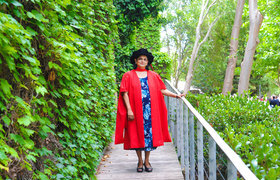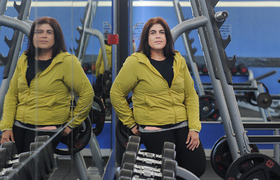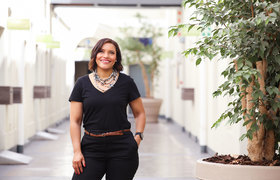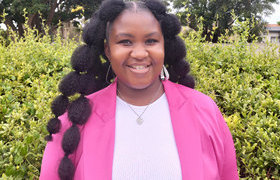Forensic scientist wants to be part of the solution to crime, violence in South Africa
23 December 2022 | Story Nicole Forrest. Photo Getty Images. Read time 8 min.![“It was exciting to watch scientists searching [for] and examining evidence that might assist in bringing justice to victims. They were putting a complex puzzle together and I wanted to be part of their team.” – Masego Sebolai](/cache/images/userfiles/images/news/2022/800x0/normal/2022-12-23_forensic-scientist.jpg)
Every year the University of Cape Town (UCT) identifies graduates whose uplifting stories serve as an example of the great heights the institution’s students can reach. Masego Sebolai, who graduated with an MSc in Biomedical Forensic Science this month, is one of those inspirational graduates.
Like many high school pupils, Masego knew that she wanted to attend university but was unsure about her course of study.
Having grown up in the small town of Tigane near Klerksdorp in the North West province, she was however certain that she wanted to help others, especially in her own community, once she qualified. Her interest in science – particularly the human body – made medicine an obvious choice, but the weight of the responsibility made her hesitant to follow this path.
“I didn’t have a clue what I wanted to study. All I knew then was that I loved biology, especially learning about the human body. But I didn’t want to be a doctor or a nurse because the idea of being responsible for someone’s health, and someone potentially dying [on] my watch, terrified me,” she explained.
Coincidentally, Masego got the answer to her academic conundrum from an afternoon rerun of the crime and forensics TV series “Bones”, which features a group of forensic scientists working with the FBI to solve crimes.
‘Love at first sight’
“It was exciting to watch scientists searching [for] and examining evidence that might assist in bringing justice to victims. They were putting a complex puzzle together and I wanted to be part of their team. It was love at first sight,” she recalled.
At the time, no South African university offered a forensic science degree. However, in 2014, when Masego was entering her second year of her undergraduate studies, the University of the Free State (UFS) introduced its programme in the specialisation, and she was able to begin a journey in her dream.
“It was exciting to watch scientists searching for and examining evidence that might assist in bringing justice to victims.”
After being accepted to the programme, Masego ran into funding issues. To compound the challenge, her younger brother died unexpectedly. And with the strong focus on death and dying in the forensic science course, the young scientist experienced difficulties separating life from learning.
“Since my degree mainly focused on death, learning about different stages of decomposition and diseases made me relive my brother’s death almost every day or at every lecture. I was using the degree to try and figure out what caused my brother's death, and I would diagnose him based on the sudden symptoms he had,” she said.
This proved emotionally challenging, so Masego knew she needed to refocus, and concentrate on the reason she had chosen this course of study.
“The degree became personal, and it took away the interest and excitement to learn, but I had to snap out of it, and accept that I couldn’t solve every problem. I made a decision to go back to treating the degree as a passion and a tool to make a difference, and bring closure and justice for others.”
After earning her undergraduate degree and an honours in forensic genetics from UFS, Masego faced another common dilemma: to search for a job or continue studying. She didn’t yet have her driver’s licence, which was a requirement for many jobs, and she also had a nagging feeling that she wasn’t yet done with her academic career.
‘There was more to learn’
Rather than giving up on her dream, Masego started a hardware business with one of her other brothers, using her salary to pay for driving lessons. She also returned to her university study notes to quieten the inner voice telling her there was more to learn.
A few years later, when UCT introduced its MPhil in Biomedical Forensic Science (BFS), Masego knew she’d found her answer. She applied and was accepted, but the challenges didn’t stop coming.
Because it was a new programme, no bursaries were available for the BFS course, nor was there any National Research Foundation funding. This difficult news was followed by COVID-19 lockdowns and another unexpected death in the family, this time of her eldest sister.
Despite all of this, Masego, with the support of friends and family, persevered: “There were enough reasons and signs that I should deregister. I almost did. But my closest friend reminded me of why I started, and my other older sister offered me a place to stay for when I would write tests or exams. Because of that support I managed to pass my first semester,” she said.
“My closest friend reminded me of why I started and my other older sister offered me a place to stay when I needed to be on campus. Because of that support I managed to pass my first semester.”
While it wasn’t entirely smooth sailing from that point onwards, the determined academic triumphed. She obtained funding from UCT Financial Aid to help cover her costs.
Then, with the assistance of Professor Elelwani Ramugondo, UCT’s Deputy Vice-Chancellor: Transformation, Student Affairs and Social Responsiveness, Masego obtained a Health and Welfare Sector Education and Training Authority bursary to complete her studies.
Now Masego aims to work for the South African Police Service (SAPS) as a crime scene investigator, to help bring justice to victims of crime and their families.
“I want to work at the SAPS as a crime scene investigator, and excel at it. I want to educate people, especially those from poor backgrounds, about forensic science; the importance of protecting the crime scene and not cleaning after our deceased loved ones, the importance of forensic evidence and the role it plays in assisting to bring justice for the victims and their families.
“I want to be part of the people who are looking at all the angles of the root cause of the high crime rate in our country, and assist in trying to find ways to decrease the rate and make our country safe,” she explained.
Beginning the real work
Although she’s eager to dive into the world of work, Masego has not ruled out the possibility of returning to academia in the future. If that day does come around, she envisions herself focusing more on the psychosocial aspects of forensic science.
“If ever I decide to study again and take a break from crime scene investigation, I would study to become a forensic psychologist or forensic social worker,” she said.
“This would allow me to be part of the group that assists victims and families to deal with the trauma they’ve experienced from a stranger, or relative or someone close invading their space, attacking them, kidnapping or killing their loved ones. I would help sexually assaulted kids become kids again.
Masego is frank that life in South Africa is becoming increasingly dangerous.
“South Africa has become a dangerous country to live in. We need more qualified people and funding for forensic science students. We need to find different ways to attack or fight the problems we’re facing. We need our country to prioritise safety for its citizens. We need to solve this problem.”
 This work is licensed under a Creative Commons Attribution-NoDerivatives 4.0 International License.
This work is licensed under a Creative Commons Attribution-NoDerivatives 4.0 International License.
Please view the republishing articles page for more information.










